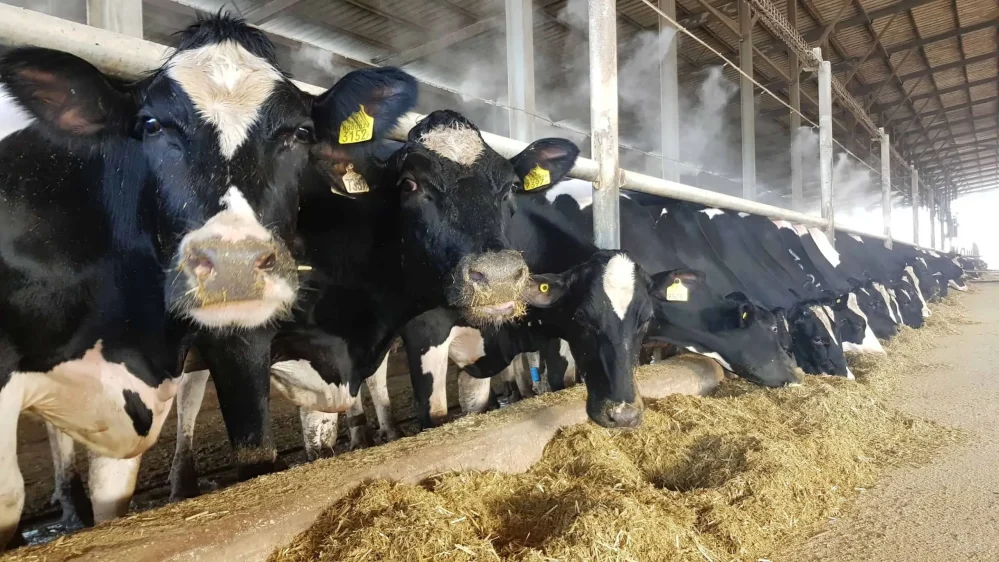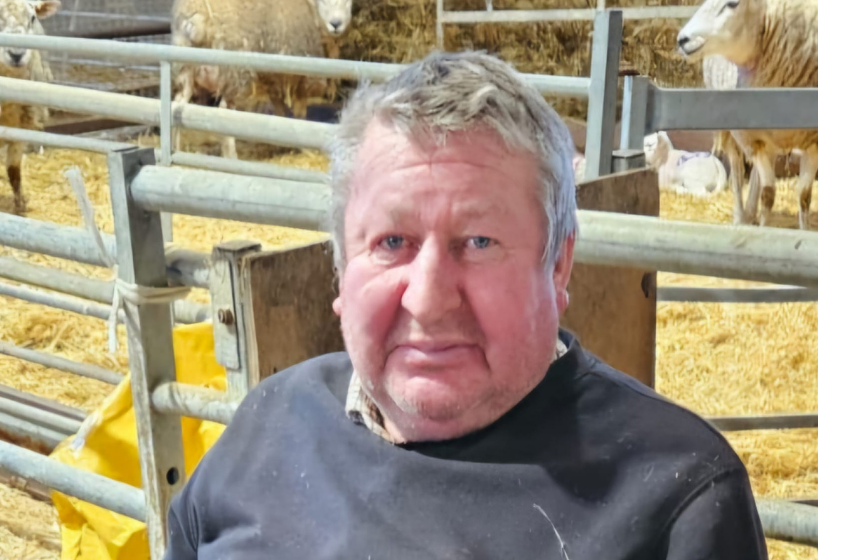Farming
Promoting fertility and milk fat production at turnout

SPRING turnout creates many dietary challenges for dairy herds that can result in butterfat depression and fertility issues. However, negative effects can be reduced by balancing rumen function and energy supply, says Dr Richard Kirkland, ruminant nutritionist for Volac Wilmar Feed Ingredients.
“As cows transition from a controlled winter ration to grazed grass, the rumen has to adapt to the differing and more-variable forage source. The diet change alone can cause challenges to rumen function and milk production stability. Additionally, the low fibre and rapid fermentability of early, leafy grass growth can disturb the rumen’s pH balance and cause the grass to pass through the digestive system too quickly, increasing the risk of acidosis,” says Dr Kirkland. “While early grass growth is high in energy, variable spring grazing conditions make it harder for energy supply to be consistently maximised, with a drop in fertility and milk production key risks.”
During early lactation, cows cannot eat enough to meet the high energy demands of milk production, leading to a negative energy balance. This means they rely on body fat stores to support the genetic drive for milk production, resulting in a loss of body condition. Research from the University of Nottingham indicates that for each 0.5-unit loss in condition during this period, conception rates can fall by around 10%.
Cereals are commonly supplemented to increase energy supply, but there is a limit on how much can be used in order to reduce the risk of the rapidly-fermentable starch pushing down rumen pH and with it increasing the risk of acidosis and low milk fat.
“Digestible fibre sources such as soya hulls, citrus and sugarbeet pulp will help balance the starchy energy sources and aid rumen function and milk fat, though offer less of the rumen ‘tickle’ factor than higher-fibre forages. With lower energy concentration than cereals, the greater bulk of forage sources will limit the potential to deliver those vital additional megajoules,” explains Dr Kirkland.
According to him, using a combination of digestible fibre sources and rumen-protected fat supplements in buffer rations will help drive milk production and support fertility in early lactation.
“In contrast to other ingredients, rumen-protected fats are not fermented in the rumen and contain around 2.5-times the energy content of cereals. This makes them an ideal choice to sustain energy supply at grass where conditions can be unpredictable on a daily basis,” says Dr Kirkland.
Selecting the right fat supplement
When selecting a fat supplement to feed in turnout buffer rations, Dr Kirkland says producers need to remember that fat is more than just an energy dense ingredient, with the blend of fatty acids having a primary impact on performance response. Therefore, fatty acid blends should reflect what the farm is trying to achieve and milk contract requirements.
“During the early lactation period, C18:1 (oleic acid) is a key fatty acid, increasing partitioning of energy and nutrients to improve body condition as well as improving development of fertilised eggs. However, given the challenges of early spring grass, products containing higher levels of C16:0 (palmitic acid) can be considered as effective ingredients to increase milk fat production,” explains Dr Kirkland.
To take advantage of the so-called ‘high-C16’ milk fat benefits while protecting fertility, Dr Kirkland recommends feeding a balanced supplement such as Mega-Fat 70. This will provide a higher level of C16:0 than the standard calcium salts but still supplies that important rumen-protected source of C18:1.
“By understanding the impact individual fatty acids have on production response throughout the lactation cycle, rumen-protected fat supplements become multi-purpose and allow producers the opportunity to balance rumen function and energy supply, while also targeting specific milk contract and herd performance goals,” concludes Dr Kirkland.
Farming
Farm building scheme near Lawrenny given go-ahead by planners

AN APPLICATION for a storage building at a south Pembrokeshire farm, made by a family member of an officer on Pembrokeshire County Council’s planning service, has been given the go-ahead by the authority’s planning committee.
In an application recommended for approval at the July 23 meeting of the authority’s planning committee, Laura Elliot sought permission for the erection of an agricultural storage building at Tedion Farm, a dairy farm near Lawrenny.
The application had been brought to committee, rather than being delegated to planning officers, due to the family connection.
The farm, near to the Pembrokeshire coast National Park border, comprises 270 milking cows and dairy heifer replacements kept on the farm comprising land over 138 hectares. The farm is mainly down to grass and the cows are paddock grazed in order to utilise grass efficiency.
No objections had been received from local community council Martletwy.
A report for members said: “The application seeks consent for the erection of agricultural storage building. The erection of an agricultural building will be used to store stay, hay and farm machinery.
“The building would be located within the existing farm complex, to the north-east of the site, adjacent to the main farm dwelling. The building will measure 18 metres in length by 13.6 metres in width, with a pitched roof height of 5.71 metres.”
Approval was moved by Cllr Alistair Cameron, seconded by Cllr Brian Hall.
Farming
Fears dairy farm near Kilgetty could increase to 3,000 cattle

PEMBROKESHIRE planners are to visit the site of one of the county’s largest dairy farms after claims were raised a scheme for new calf buildings could lead to animal welfare issues and an increase in the size of the herd to 3,000 cattle.
At the July 23 meeting of the council’s planning committee, an application by Hugh James of Langdon Mill Farms Ltd for a calf building, weaned calf building, and associated yard areas, at Langdon Mill Farm, near Jeffreyston, Kilgetty was recommended for conditional approval.
Local community council Jeffreyston has raised concerns, made by a member of the public, on potential increased noise and odour from the scheme, planners heard.
A supporting statement, through agent Reading Agricultural Consultants, said: “The holding currently has a milking herd of approximately 2,000 cows, which are housed indoors for the majority of the year, with dry cows [cows that are not lactating, prior to calving] and heifers grazed outdoors when weather and soil conditions permit.
“There has been significant investment in buildings and infrastructure at the farm over the last decade in respect of cattle accommodation, slurry storage, milking facilities, Anaerobic Digestion (AD) plant and feed storage. The unit is efficient, achieving yields of more than 10,000 litres/cow/year, with cows being milked three times/day in the 60-point rotary parlour.”
Currently, calves are reared at Langdon Mill Farm for two months before being transported off-site to be reared at a number of third-party farms in the area before being return later; the proposed 61.2m long calf building is required to accommodate young-stock, following separation from the cows, to two-months, with the 164.8m weaned calf building to be used for calves from two months to seven months.
The application says the proposals would “clearly make the enterprise more financially robust by reducing reliance on third party farms”.
However, concerns were raised at the committee meeting by objector Ian Dennis, a former vet of some four decades’ experience, who described Langdon as occupying 3,000 acres of land with 2,000 cattle currently that “are never allowed to graze,” the proposal, he said, would add another 1,000 cattle to the site.
“This is factory farming, an intensive livestock unit, no longer a farm.”
He told planners a “mendacious and incorrect” ammonia emission report submitted by the applicants was “designed to bamboozle,” saying, despite his experience and scientific background, he needed expert support to assess.
He said only average figures were reported, rather than peaks and troughs, adding the “fictitious anaerobic digestion plant” had yet to be built, with planning permission now lapsed.
However, officers told members the applicant’s agent had said works on the digestor had actually started.
On the issue of animal welfare, Mr Dennis said he had “very huge concerns” about the scale of the development, differing from a planning officer report saying the scheme would bring animal welfare benefits.
A suggestion by committee chair Cllr Simon Hancock the application be deferred pending a site visit was unanimously backed by committee members present.
Farming
Family pay tribute to farmer, 65, who died in quadbike accident

A WEST WALES farmer has died after an incident involving a quadbike.
Dyfed-Powys Police have confirmed they attended a report of an incident involving an agricultural quadbike in a field in the Llanilar area of Aberystwyth on July 17.
The force has confirmed that a 65-year-old man died at the scene.
They said that his next of kin have been advised and are being supported by specialist officers. The HM Coroner and Health and Safety Executives have been informed.
His family have paid tribute to him. The family said: “Hugh Tudor was a 65 year old farmer who had farmed at Tynberllan, Llanilar with his wife Ann for over 40 years. He was a devoted father to Sara, Lowri and the late Gwenno.
“Hugh was the son of the late Tom and Sybil Tudor of Glanystwyth and brother to Richard.
“Farming was his life, but he also had a wide range of interests and was actively involved in all aspects of the local community in Llanilar and beyond.
“We would like to thank everybody for their support and kindness during this difficult time.”
-

 Education5 days ago
Education5 days agoMilford Tesco worker achieves Oxford dream and lands top legal job
-

 Crime4 days ago
Crime4 days agoHaverfordwest man admits having nearly 1000 child and animal images
-

 Crime4 days ago
Crime4 days agoYouth set to appear in court over serious sexual offences
-

 Crime4 days ago
Crime4 days agoPolice investigating after man injured during altercation in cemetery
-

 Education4 days ago
Education4 days agoPupils delight in ice cream treat from Pembrokeshire’s number one van
-

 Crime4 days ago
Crime4 days agoTown centre ‘stinking of skunk’ as police strip cannabis farm
-

 Crime3 days ago
Crime3 days agoFag-butt police court summonses spark debate in Pembrokeshire
-

 News6 days ago
News6 days agoProposal to give firefighters a council tax discount to go to Cabinet






























